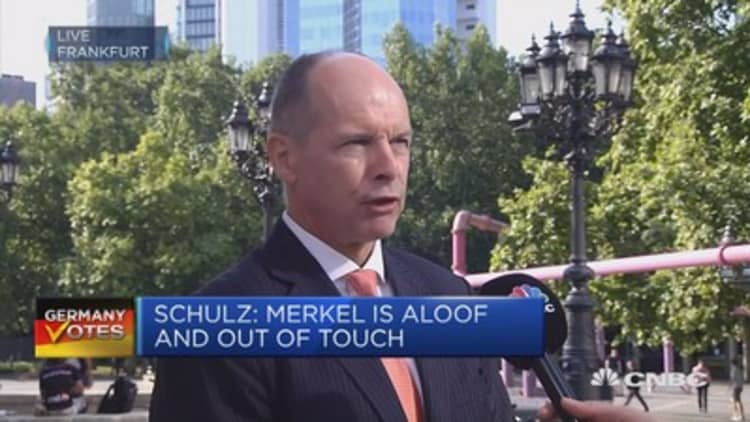If pollsters are to be believed, half of all Germans eligible to vote will be glued to their television sets on Sunday evening for the only debate between Chancellor Angela Merkel and her challenger, Martin Schulz. In a campaign that otherwise feels soporific to outsiders, and even to Germans, this "showdown" will pass as a climax. Can Schulz, trailing badly in the polls, land a punch? Will Merkel, comfortably ahead, seem robotic or defensive in parrying his blows?
These questions are fun, and we will soon have answers. But they distract from a bigger point: Germany should not have such debates at all, for they are, like so many things in Germany, an American import that does not fit into Germany's culture of democracy, which is very different from America's.
More from Handelsblatt Global:
Job Opening: Leader of the Free World
The debate format that is indigenous to German democracy is the so-called "elephant round". In such a gathering the leaders ("elephants") of all the political parties in the Bundestag converge around a table for a discussion that, in practice, is more chaotic, less scripted and vastly more revealing and informative than any US-style debate. During the 1970s and 80s, these rounds were major political spectacles on television. They had no time limits; one, in 1976, went on for four hours! Smoke billowed around the dueling peacocks, especially when Helmut Schmidt, a chain smoker, was involved. Small parties were heard just as much as large parties, as all sides auditioned for the voters' favors based on their manifestos and ideas and armed only with their wit.
This style fits German democracy because Germans do not elect their chancellor directly, as Americans do (via an electoral college that nowadays only amplifies the often close results in each state). On their ballots, Germans tick two boxes: In the first, they choose a representative for their own district, rather as Brits and Americans do. In the second and more important box, they choose a party. These second votes determine how the various parties will be represented in proportion to one another in parliament. The purpose of this system was and is to favor ideas over personalities and coalition bargaining and compromise over all-or-nothing swings between rival ideologies.
Simultaneously, however, Germans have always been fascinated by the more blustering and theatrical American style of democracy. Those Germans with television sets in 1960 were as rapt as Americans by a badly shaven and shifty Richard Nixon, wilting beside a tan and youthful John Kennedy. They cringed when George H.W. Bush checked his watch on stage; winced as Al Gore puffed his beefy frame behind Bush junior; and almost fainted as Trump did to Hillary Clinton whatever one calls that sort of thing. What drama. If German elephant rounds evoked the smoky, intellectual and very European air of Madame de Staël's salons, American presidential debates had the atavistic appeal of the O.K. Corral.

But the laws of media evolution favored the O.K. Corral over the salon, even in Germany. It didn't help that Helmut Kohl, the most elephantine of all former chancellors, boycotted elephant rounds in the 1990s — probably because in his regal self-understanding he just couldn't be bothered — thus leading to their decline. His successor, Gerhard Schröder, who fancied himself God's gift to TV screens, then embraced the American debate format in 2002. Along with it came — albeit in an attenuated form, for now — the American evils of spin doctors, stock phrases and sound bites.
Ms. Merkel first mounted a stage against Mr. Schröder in 2005. Then, as in 2009 and 2013 (pictured), she did anything but shine. But she always survived, and then prevailed. Perhaps German voters, as though out of an old instinct that democracy should not be a shoot-out, actually prefer the rhetorically understated candidate when they step into the booth. Perhaps she knows that, and adjusts her body language to that insight. Then again, she knows nothing that Mr. Schulz doesn't know. So come back to Handelsblatt Global on Sunday night to see how the spectacle turned out. But remember that there is a better way.
Andreas Kluth is the editor-in-chief at Handelsblatt Global, follow Andreas on Twitter @andreaskluth

